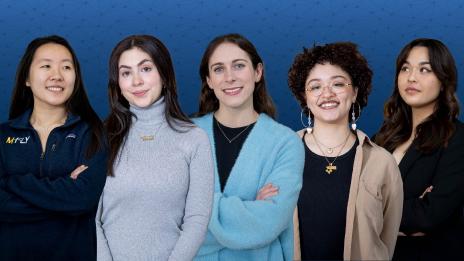By Anissa Gabbara
When Madelon Stockwell arrived in Ann Arbor to attend the University of Michigan over 150 years ago, she caused quite a ruckus. Her initial appearance left her all-male peers stunned. Some deemed the disruption necessary. Some just couldn’t fathom a woman on campus. As Michigan’s first female student, she had to bear the brunt. But little did she know, she would blaze a trail.
Stockwell’s attendance spearheaded a transformation at U‑M, displaying a level of leadership that would cement women’s place on campus for decades to come. Following her death in 1924, her impact would span even further, leaving $10,000 to support women in the College of Literature, Science, and the Arts (LSA), and requesting that officials give heed “to excellence of character, and to intellectual promise, as well as to the need of help.”
Laying the cornerstone
In 1890, as more women enrolled at U‑M, the Women’s League was formed to create a sense of community among female students on campus. In 1921, the organization committed money to seed a women’s building and submitted a request for approval to the Board of Regents to raise $1 million—$750,000 for construction and $250,000 for an endowment. Seven years later, the cornerstone was laid for the Michigan League, the charming student union that graces the north end of Central Campus.
Since then, the impact of women’s philanthropy at U‑M continues to transform the university’s programs and priorities. Here, Mary Petrovich and Teresa Sebastian—two of many notable women who have graduated from U‑M—talk about why they give and why it matters.
Showing up for the game
Mary Petrovich (BSEIO ’85) likes to think of herself not as a female philanthropist, but simply, a philanthropist. She has successfully led and transformed several automotive and industrial businesses, and is currently an operating executive at the Carlyle Group, a global investment firm. She also serves as executive chairman of DealerShop USA. Additionally, she serves on six different boards of directors where she’s typically one of the only women. But breaking down barriers in male-dominated fields would become a recurring theme in her life, starting at Franklin Hills Country Club as a 12-year-old caddie.
Growing up in a struggling family of eight, Petrovich credits her caddying career for changing the trajectory of her life.
“I was the first in my family to go to college,” Petrovich said. “I had an Evans Scholarship to go to the University of Michigan from caddying for nearly eight years, so I’m a big supporter of getting more young ladies caddying as a way to change the course of their life.”
Petrovich’s affinity for athletics followed her to U‑M, where she lettered on the softball team and served as a starter and captain. In retrospect, she pats herself on the back for persevering through the pressures of thriving as a student-athlete while pursuing an engineering degree. Establishing the Petrovich Family Endowed Scholarship for Softball to aid student-athletes studying business or engineering who demonstrate leadership skills, Petrovich’s dedication to both athletics and engineering is evident.
In 2014, she established the Mary L. Petrovich Endowed Scholarship Fund for Future Leaders and the Leadership Program Fund, supporting Michigan Engineering Leadership Weekend. These gifts aim to enhance the experience of female engineering students at U‑M and provide financial assistance. Petrovich’s giving also spreads across Michigan Medicine, creating the Mary L. Petrovich Artificial Intelligence in Gastroenterology Fund to find less invasive solutions for diagnostics, after experiencing a health crisis.
“We’ve really moved the needle forward on making sure what happened to me never happens to anyone else again.”
Having a seat at the table
Hailing from Immaculata High School, an all-girls Catholic school in Detroit, leadership was ingrained in Teresa Sebastian (BGS ’78) early on. She serves on various boards of directors and has held the highest leadership positions throughout her business and law careers. Currently, she’s president and CEO of The Dominion Asset Group, a firm she founded that invests in urban real estate and commercial ventures.
“We learned to not shy away from leadership, and to not accept institutions marginalizing our voices,” she said. “That’s why when I came to Michigan’s campus and started getting involved in various efforts, it didn’t dawn on me that someone would marginalize my voice, because I was used to being empowered in asserting myself.”
A strong advocate of diversity, equity, and inclusion (DEI) efforts on campus, Sebastian has become personally involved in DEI initiatives and providing financial support, specifically to the Comprehensive Studies Program (CSP), a student success program serving undergraduate students at U‑M, many of whom identify with populations that have been historically underrepresented.
“It makes me smile when I see these students being successful, going to Summer Bridge, and having the tools they need. And when I hear about the wonderful things that are happening in CSP, I remember how I was benefited by somebody’s dollars back in the ’70s when I was on campus,” Sebastian said. “Now, that momentum is continuing, and I want to see it continue because I know the life that I’ve been able to build and the contribution that the university made to that.”
Sebastian also serves as a co-chair of the Executive Committee of the LSA Dean’s Advisory Council (DAC) to not only contribute to students’ financial capability while attending U‑M, but to help enhance their experience on campus.
“We need to set the template for continuing the growth of our children who desperately need us; more than just to write a check,” Sebastian said. “We need to be there to let them know that they matter, and how to get along with each other culturally, because I believe there are students of color who are feeling lost. Society is getting harder, and they could use our words of wisdom.”
Why it matters
It’s the philanthropic spirit that women possessed all along, but was seldom recognized.
Research from the Women’s Philanthropy Institute showed that as women’s wealth rises, they are more likely to give to charity than men of equal means. Additionally, research conducted by the Indiana University Lilly Family School of Philanthropy found that women spread their giving across more organizations than men, supporting a higher number of causes. The same data showed that women volunteer at higher rates than men and are more likely to engage in collaborative giving by participating in “giving circles.”
“Women’s philanthropy is important because we are nurturers by our societal norms and traditions, and when I use the word ‘nurture,’ I’m thinking in terms of us being very influential in how our children are raised,” Sebastian said. “We are leaders, and we should be leading not just from the viewpoint of instilling basic life skills, but we also should be leaders in character—how to love each other and how to take care of each other.”
‘To whom much is given, much is expected’
As a proud alumna, Sebastian relishes seeing Michigan students receive the support she once did. Her mother, an educator, and father, a minister and educator, the spirit of taking care of others was infectious.
“My parents didn’t have a lot, but what they gave was their time and they lent their advice,” she said. “The fortunate thing for me is they sacrificed and took me to the next level where I could not just give my time, but I could write checks. My hope is that my children will be able to take that one step further, whether it’s to create endowments or fund scholarships that perpetuate through the decades to benefit multiple students.”
For Petrovich, paying it forward to give others the same opportunities she had is paramount, and she hopes to continue paving the way for future generations of women in business and engineering to steer the ship.
“We’re moving women up in terms of status and visibility, and as those things happen, the philanthropic endeavors and opportunities will continue to grow,” Petrovich said. “At Michigan, I think we’re going to see more female leadership where, to be quite candid, men are going to drop what they’re doing and pay attention, not because she’s a woman, but because she’s just good.”
Read on for more examples of women’s philanthropy at U‑M
Jane Och (MAcc ’86)
Founder and Inventor, The Inside Scoop/Joab Bagels, LLC and Guac-Lock, LLC; Co-founder, Willoughby Capital Holdings, LLC
In 2014, Jane Och and her husband, Daniel, launched the Och Initiative for Women in Finance in the Stephen M. Ross School of Business. The initiative was created to encourage women to attend business school and explore careers in finance. It also offers students valuable resources to support their success.
Penny Stamps 1944‒2018 (BSDes ’66, TeachCert ’66, DFAHon ’18)
Former teacher and business owner
The legacy of Penny Stamps is defined by her passion for learning and advocacy of the arts. In 2006, she and her husband, Roe, established the Stamps Scholars Program, funding multi-year scholarships for more than 1,800 students at 44 colleges and universities nationwide, including U‑M. In 2012, the Stamps Family Charitable Foundation granted the School of Art & Design’s most generous gift in history. As a result, the school was named in her honor.
Helen Zell (AB ’64)
Executive Director, Zell Family Foundation
The Zell Family Foundation is a symbol of Helen Zell’s love of literature. It provides support for U‑M’s Helen Zell Writers’ Program, a two-year graduate program in creative writing with a concentration in either fiction or poetry. In addition, the “Zellowship” provides each student with post-graduate financial support so they can focus solely on writing.
Women Mean Business
Just last fall, the Stephen M. Ross School of Business launched a new initiative called Women Mean Business to encourage female philanthropy. The goal is to raise $50 million to go toward increasing access to a Ross business education, enhancing its programs, and advancing research.

